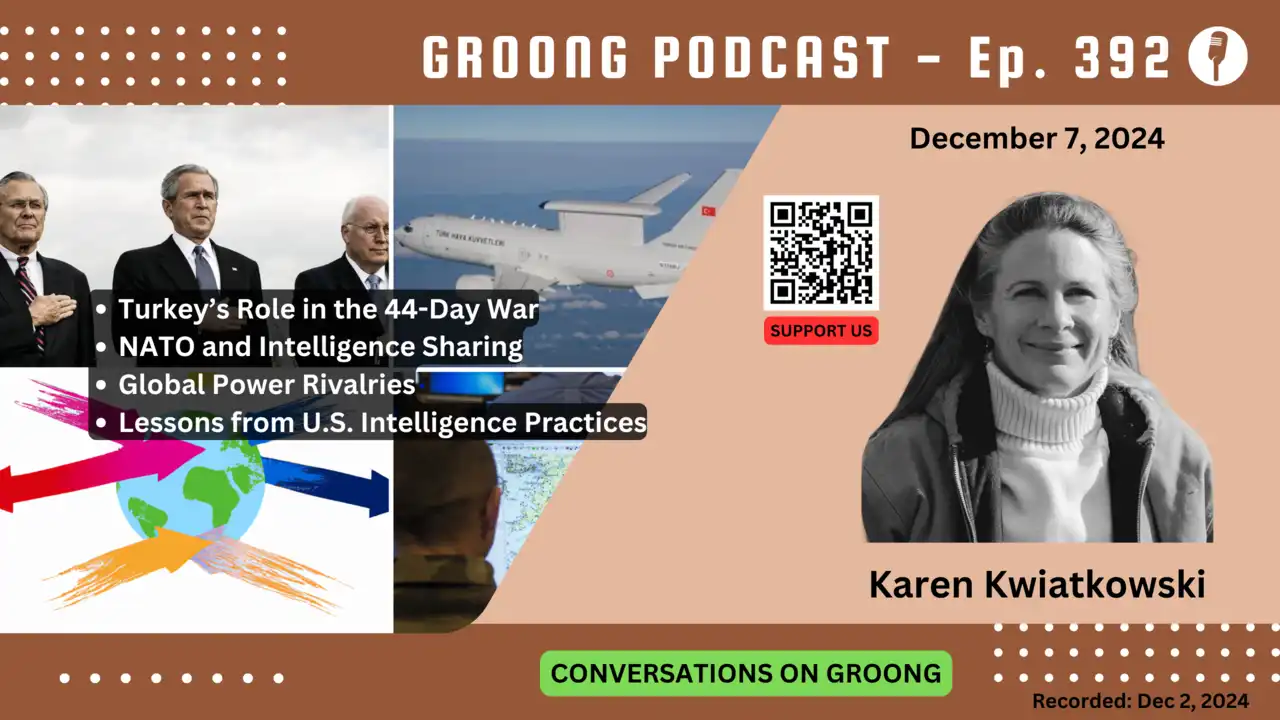
Groong Links:
Guest:
Topics:
- Turkey’s Role in the 44-Day War
- NATO and Intelligence Sharing
- Global Power Rivalries
- Lessons from U.S. Intelligence Practices
Episode 392 | Recorded: December 2, 2024
Show Notes
Topics
Introducing Karen Kwiatkowski
Although this is your first time on our podcast, your reputation certainly precedes you. You’re a widely respected expert on military intelligence and a vocal critic of flawed U.S. foreign policies over the years. As a founding member of Veteran Intelligence Professionals for Sanity (VIPS), you’ve worked to expose the misuse of intelligence to justify war.
During your distinguished Air Force career, you served as a Pentagon desk officer and worked with the National Security Agency (NSA). But it was your bold critiques—especially your essays exposing political corruption in military intelligence leading up to the 2003 Iraq War—that cemented your place as an important voice in this field.
For those who may not be familiar with your story, can you share a bit about your background? Specifically, how did you come to oppose the false intelligence that was used to justify the U.S. invasion of Iraq in 2003?
Earlier this year, Kwiatkowski penned a 3-part article series in The American Conservative:
Birth of a Unipolar World
The world is witnessing multiple conflicts that are reshaping regional and global dynamics. In Ukraine, a brutal war continues as Russia and the West compete for influence. In the Middle East, the ongoing war in Gaza has brought immense devastation, with over 45,000 Palestinians killed, the majority of them being women and children.
Meanwhile, Lebanon has just seen a ceasefire agreement after intense fighting between Israel and Hezbollah, albeit even that ceasefire was violated at least 52 times according to the government of France.
At the same time, in Syria, Turkish-backed forces have attacked major cities in the north, threatening total regional instability.
Questions:
- First, since you specialize in intelligence, can you tell us what is the role of the United States in shaping Ukraine’s strategy, particularly in terms of intelligence and its sharing with Ukrainian forces?
- Are these conflicts that we’re witnessing—Nagorno-Karabakh, Armenia, Ukraine, Gaza, Lebanon, Syria, and other global conflicts—interconnected, and how?
- Are we witnessing the painful birth of a new world order? And what will be the role of the US and the US military power in that new world order?
44-Day War and the Intelligence Factor
Azerbaijan’s 44-day war in 2020 over Nagorno-Karabakh reshaped the South Caucasus and underscored the impact of foreign involvement in modern conflicts. The war led to the ethnic cleansing of 150,000 Armenians from their homeland in Nagorno-Karabakh.
Some suggest the 2020 war was a Western trap for Russia. Scholar Glenn Diesen on our podcast (Episode 359) noted Russia’s dilemma: intervening for Armenia risked tensions with Turkey and Azerbaijan, while non-involvement damaged its reputation as Armenia’s ally. A 2019 RAND report titled Extending Russia discussed “exploiting tensions in the South Caucasus” to strain Russia’s resources.
Another point that may interest you in that now infamous report talks about the attractiveness of Azerbaijan’s geographic position as a “prime location” for intelligence gathering.
Post-2020, Russia’s influence in Armenia has declined sharply. Armenia’s government partly blames Russia for the loss and has pivoted toward the West, aligning with the outcomes predicted in the RAND report.
Questions:
- We realize your focus as an expert may not be on Armenia, do you have any thoughts on this? In your opinion, what was the US and Western role here, a simple innocent bystander that was powerless to prevent the war and subsequent ethnic cleansing, an unwilling beneficiary, or potentially worse?
- What broader lessons can be drawn about local conflicts being used as tools in global power rivalries? Given your experience in Africa, can you point to similarities with other countries or regions there?
The conflict in Nagorno-Karabakh has been going on for 3 decades. During that time, there have been various attempts to test the strength of Karabakh’s defences by Azerbaijan, including a war in 2016. Yet, Azerbaijan was not able to achieve success. Many analysts that we’ve talked to argue that Turkey’s involvement in this war (as opposed to previous cases) was the key determinant of the outcome.
While Turkey didn’t commit a huge amount of troops:
- Turkey sent Syrian mercenaries to Azerbaijan
- There were reports about Turkish special forces taking part
- Four or more Turkish generals were incorporated into the Azerbaijani armed forces
- The “drone war” was reportedly led by Turkey from AWACS aircraft on Turkish territory
- Erdogan took part (along with Aliyev) at a parade in Baku celebrating “their victory”
- Erdogan boasted of that involvement, when he threatened Israel with the fate of Karabakh
One aspect of Turkey’s involvement in the 44-day war remains particularly opaque: its role in the initial operational success achieved by Azerbaijan. In the opening moments of the conflict, Azerbaijani forces were able to destroy a significant portion of Armenian air defense systems and other critical targets, a victory widely attributed to their access to advanced intelligence. Many analysts suggest that Turkey’s contributions in terms of ISR—Intelligence, Surveillance, and Reconnaissance—were as vital as its other forms of support it provided.
Turkey, with the second-largest army in NATO, is a formidable military power in its own right. However, the question arises: were Turkey’s own ISR capabilities sufficient to enable such a decisive initial strike? Or did Turkey leverage its NATO membership to access the alliance’s collective ISR resources under the joint ISR program?
While it’s unlikely NATO would disclose details of its intelligence-sharing practices, the possibility of Turkey utilizing NATO’s assets raises important questions. Could Turkey have accessed NATO’s ISR resources without at least tacit approval from the alliance? And if approval was required, could this imply that NATO, in some capacity, encouraged, facilitated and influenced the outcome of the war against Armenia and Nagorno-Karabakh?
Questions:
- How would an investigative journalist or analyst approach uncovering the extent of Turkey’s ISR contributions during the war?
- How do NATO countries manage the sharing of ISR resources, and could Turkey have leveraged NATO’s collective ISR power to support Azerbaijan?
- If Turkey utilized NATO’s ISR assets, does that suggest NATO indirectly guided the war effort against Armenia and Nagorno-Karabakh?
Wrap-up
That’s our show! We hope you found it useful. Please find us on Social Media and follow us everywhere you get your Armenian news.
Thanks to Laura Osborn for the music on our podcasts.
Guests

Ltc. Karen U. Kwiatkowski
Ltc. (ret.) Karen U. Kwiatkowski is a retired U.S. Air Force officer whose assignments included duties as a Pentagon desk officer and various roles for the National Security Agency.
After retiring, she become a noted critic of the U.S. involvement in Iraq. Kwiatkowski is known for her insider essays denouncing a corrupting political influence on military intelligence, especially leading up to the 2003 Iraq. In 2012, she challenged incumbent Bob Goodlatt in the Republican primary for Virginia’s 6th district in the U.S. House of Representatives.
While in the Air Force, she wrote two books, Africa: African Crisis Response Initiative: Past Present and Future (2000) and Expeditionary Air Operations in Africa: Challenges and Solutions (2001). She contributed to Ron Paul: A Life of Ideas (2008) and Why Liberty: Personal Journeys Toward Peace and Freedom (2010). She has been featured in several documentaries, including Why We Fight (2005). She has written for LewRockwell.com since 2003 and her work has appeared in Salon and The American Conservative. She has an MA in Government from Harvard, an MS in Science Management from the University of Alaska, and a PhD in World Politics from The Catholic University of America; her thesis was titled Angola, A Case Study of the Implementation of the Reagan Doctrine. She is a founding member of Veteran Intelligence Professionals for Sanity.
Hosts

Asbed Bedrossian
Asbed Bedrossian is an IT professional, and for years oversaw the central IT enterprise infrastructure and services at USC. His decades of experience spanned across IT strategy, enterprise architecture, infrastructure, cybersecurity, enterprise applications, data center operations, high performance computing, ITSM, ITPM, and more.
Asbed founded the Armenian News Network Groong circa 1989/1990, and co-founded the ANN/Groong podcast in 2020.

Hovik Manucharyan
Hovik Manucharyan is an information security engineer who moved from Seattle to Armenia in 2022. He co-founded the ANN/Groong podcast in 2020 and has been a contributor to Groong News since the late 1990s.
Disclaimer: The views expressed by Hovik Manucharyan on the ANN/Groong podcast are his own and do not necessarily reflect the opinions of his employer or any other organization.